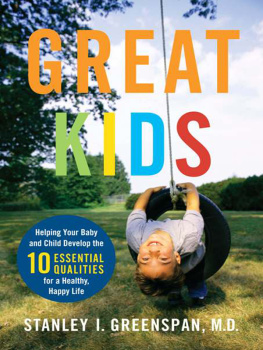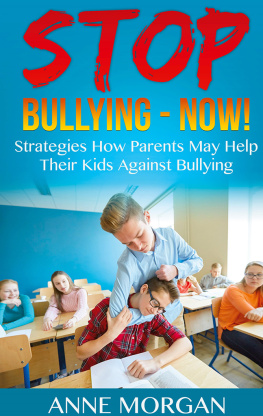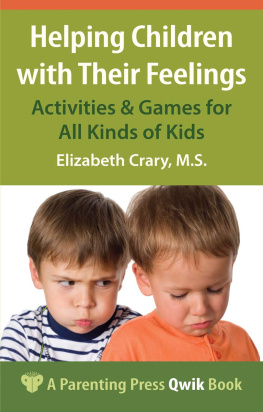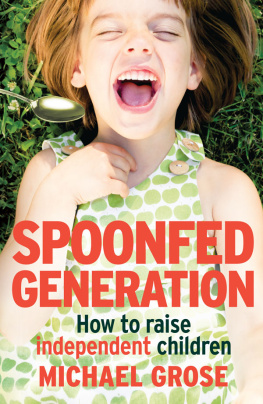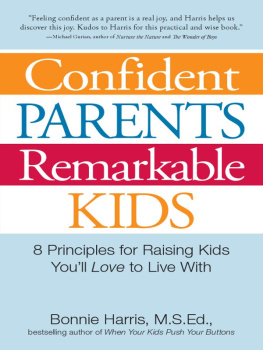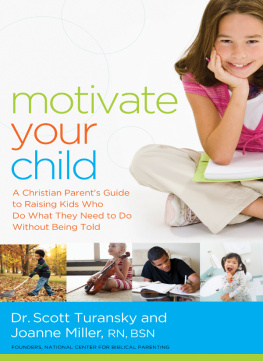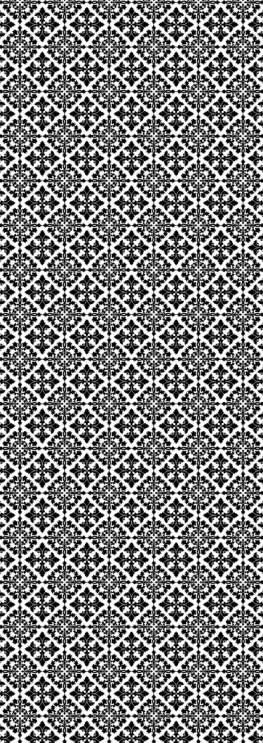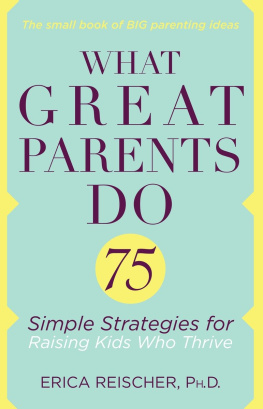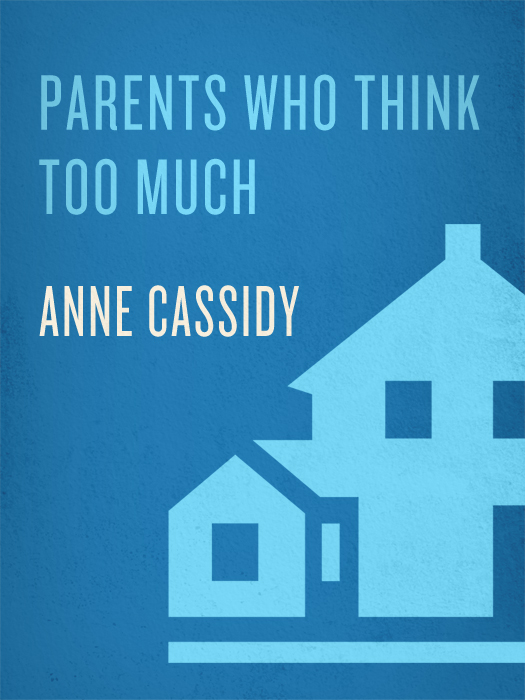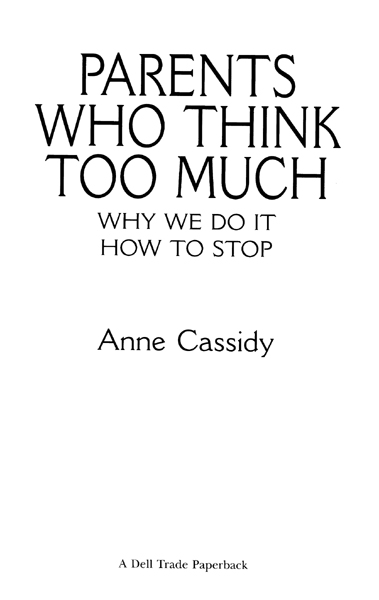WHATEVER HAPPENED TO GOOD, OLD-FASHIONED CHILDHOOD?
It seems more endangered than the rain forestsan old-fashioned childhood, one in which play is deliciously unorganized; children are left alone to make their own fun; parents talk with and shape their children instead of analyzing and scheduling them; children are members of the family, not prized possessions.
I want to raise children who are children, first of all, who are delightfully different from adults, who believe in fairy tales and magic, and who see the world in that crazily skewed way that kids do. I realize that I risk being thought indulgent and nostalgic, and Im willing to take that gamble. Our parents, or I suppose I should say my parents and other parents I knew, were child-centered enough to give us paradise, but not so child-centered as to spoil us with its fruit. I see no reason why we cant hold on to many of the time-tested ways. In fact, I know we canas long as we have faith in ourselves and trust our instincts. We may have to dig deep to remember the old songs and sayings. And if our parents raised us wrong, then we must do better. But we dont have to second-guess every gut feeling we have.
from Parents Who Think Too Much
A DELL TRADE PAPERBACK
Published by
Dell Publishing
a division of
Bantam Doubleday Dell Publishing Group, Inc.
1540 Broadway
New York, New York 10036
Copyright 1998 by Anne Cassidy
All rights reserved. No part of this book may be reproduced or transmitted in any form or by any means, electronic or mechanical, including photocopying, recording, or by any information storage and retrieval system, without the written permission of the Publisher, except where permitted by law.
The trademark Dell is registered in the U.S. Patent
and Trademark Office.
Library of Congress Cataloging in Publication Data
Cassidy, Anne
Parents who think too much: why we do it,
how to stop / Anne Cassidy.
p. cm.
eISBN: 978-0-307-76704-2
1. Parenting. 2. Child rearing. 3. Parent and child.
I. Title.
HQ755.8.C395 1998
649.1dc21 97-50127
v3.1_r1
For my mother,
Suzanne Concannon Cassidy
Acknowledgments
Parents Who Think Too Much is about families, so it is my family I acknowledge first. I couldnt have written a book about parents who think too much had I not been raised by parents who thought just the right amount. So above all, I thank my mother and father, Suzanne and Frank Cassidy. They brought up four children with wisdom, love, and humor, and all they used was Dr. Spock! I thank my father for his ready kindness and his unwavering optimism. Most of all, I thank him for always believing in me. To my mother, fellow writer and kindred spirit, who read each chapter the minute it rolled off the fax machine, I owe more than I can ever repay or describe. Her sensitive criticism of my early childrearing style helped me think less and feel more; many of the thoughts in this book are ones weve talked about for years. Her love of ideas and her writerly encouragement are constant inspirations.
My husband, Tom Capehart, has been the calm heart at the center of the storm that is writing a book, keeping me steady with his insight and devotion. He always seemed to know when to take the girls out to the park or the hardware store or halfway across the country in a small station wagon so I could get some writing done. I thank him for this, for reading and talking about every chapter and for cheering me on again and again.
Without my daughters, Suzanne, Claire, and Celia, there would be no book. They have given me a glimpse of the depth and kindness of a childs heart, and I hope they wont mind that Ive shared some of their stories. So heres to Celia, who learned to say book before many other words; to Claire, who when I was hurrying to meet my deadline admonished me, Mommy, we want you to be done, but dont go too fast, we want your book to be good; and to Suzanne, who one day early in the project gave me a written pep talk, which said, Have faith in yourself, Enjoy it, and Share it with all family members. Well, here it is!
My sister, Ellen, and my brothers, Phillip and Drew, prove that the bonds we form in childhood can sustain us all our life long. I thank them for always being there for me.
Much gratitude goes to my agent and friend, Lisa Bankoff, of International Creative Management. From the moment I uttered the words parents who think too much, she has been an unflagging champion of this book. She got it, when there wasnt much yet to get and found this book a loving home at Dell. No writer could hope for a more enthusiastic editor than Mary Ellen ONeill. She has been with me, and for this book, every step of the way. I greatly appreciate her warmth, insight, and encouragement.
I owe a debt beyond measure to all the parents who helped me by sharing their thoughts, stories, and confessions. A few went far beyond the call of duty. Chris Anderson spoke to me on numerous occasions and always seemed to know what kind of anecdote I needed. Heather Babiarz hosted a discussion group for me one hot summer day. Tiff Wimberly kept me posted on television specials, Web sites, and possible interviewees. My book group friends became a special cheerleading squad. My thanks go to Kathy Boesch, Sue Brickman, Linda Falkerson, Donna Konigsberg, Maureen Lynch, Eileen ONeill, Diana Scott, Toosie Smith, Susan Tullington, and Marianne Vakiener. And then there are my friends of the heart: Nancy Emison, indexer extraordinaire; Deborah Costlow, legal adviser; and Kay Rolland, foreign correspondent.
My deepest appreciation goes to the many fine magazine editors with whom Ive had the privilege to work. My career as a writer would also not be possible unless hundreds of parenting experts had taken the time to talk with me through the years. I thank them alleditors and experts. In spite of the general comments I make in this book, I have the utmost respect for their integrity and accomplishments.
Finally, where would any working mother be without someone to watch over her children when she cant? I was lucky enough to find Eva Kenderesy about the same time I began work on this book. She has helped give our children an old-fashioned childhood when we havent been there to do it.
Contents
CHAPTER ONE : RAISING CHILDREN BY THE BOOK
When Youd Rather Raise Them by Heart
CHAPTER TWO : OUR CHILDREN, OUR SELVES
Why Childrearing Is Now Called Parenting
CHAPTER THREE : ATTENTION EXCESS DISORDER
The Malady of the Decade, and What It Means for You
CHAPTER FOUR : ITS JUST A STAGE
And Other Excuses for Feel-Good Discipline
CHAPTER FIVE : SUPERBABY GROWS UP
Living in a Society Where Everyones Above Average
CHAPTER SIX : ARE WE MAKING THE WORLD TOO SAFE
FOR OUR CHILDREN?
Keeping Independence and Trust Alive in a Scary World
CHAPTER SEVEN : PC PARENTS
How Commercialism Has Changed Usand Our Children
CHAPTER EIGHT : KIDCENTRICITY
It Isnt Easy Being a Grown-up
CHAPTER NINE : I AM A PARENTING CLASS DROPOUT
In Search of Instinct
Prologue
F or the last 12 years, Ive written over a hundred magazine articles for parents. I am part of a vast network that carries information and opinions from psychologists and other experts to millions of people like you. The topics range from thumb-sucking to self-motivation, but the underlying message is always the same: go easy on your child and hard on yourselves. If your youngster acts up, hes just expressing developmentally appropriate behavior. To deal with it, you must learn techniques to sidestep right and wrong. Forget parental outrage; it is hopelessly out of date.


